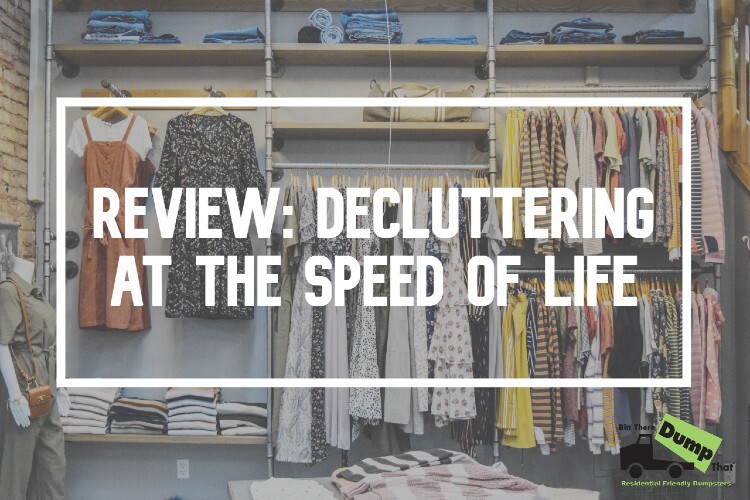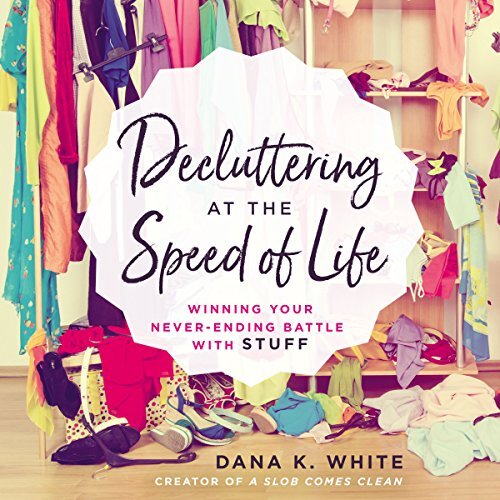
Do you know the definition of decluttering, as described by Dana White in her book, Decluttering at the Speed of Life?
Decluttering means coming to terms with the problem of having too many things
Have you come to terms with your problem of having too many things? Does clutter have too much an impact on your physical and mental being?
If so, let’s discover some insightful tips that will help you identify the issue, embracing a new mindset and keeping the clutter away for good.

The root of our clutter problem is that we hold on to things for our “ideal” life rather than our actual life. White helps homeowners declutter by deconstructing it into a manageable and straightforward process that makes it less daunting, less overwhelming and adaptable to different living spaces.
According to White, decluttering is getting rid of things you don’t need. Donating is a great way to accelerate this.
Donating bypasses the need to find a place for the item or create an online listing to sell it. When your emotional or mental attachment to the thing prevents you from tossing an item into the “donate” box, White recommends her container concept.
A container keeps things under control. They hold a certain number of items and cannot exceed that threshold.
White explains that if we view our home, rooms, pantries, and shelves as “containers,” we can better understand what can and can’t fit inside them. To quote White, “Accept the limitations of the space you have.”
This mindset means only keeping items that can comfortably fit in the space available. If you have shelf space for three pans, but you’ve stuffed six in there, get rid of half of them. If your hat collection is becoming unmanageable, hang up the favourites and get rid of those that didn’t make the cut.
In other words, the container decides how much you can keep while you choose what you own.

Dana’s process for decluttering includes five simple steps:
These five steps are the key to decluttering.
Collect garbage like empty water bottles, used napkins, and expired coupons. Tossing out junk starts the decluttering process and builds momentum.
White coins the term “Procrasticlutter,” referring to clutter that needs to be put away but hasn’t yet. Clutter like this requires no actual decision in regards to keeping, donating or selling.
It simply needs to be put away. Clean dishes that are sitting in a dishwasher fall under this category of “easy stuff.” Glancing around the room to find easy stuff heavily reduces the volume of clutter and shrinks the mess down significantly.
Items in this category are considered obvious discards at first but need to be discarded. These are things you have meant to get rid of but never got around to throwing away—something like an old itchy sweater you always hated or an antique lamp that you never liked.

“If I needed this item, where would be the first place I’d look for it?” The answer to that question is where you’d store the item.
If the answer to the first question doesn’t come to you, then you move on to the second question; “If I needed this item, would It ever occur to me that I already had one?”
If not, it likely won’t get much use, or you won’t need it enough to justify keeping it.
The final step is White’s container concept. If you want to keep something but there’s no space where it belongs, you make it fit.
Remove something from the container that is less worthy than the item you want to keep. If the container looks full but is full of unnecessary items, consolidate and make things fit.
If your cluttered life’s brought you to the point where you have four half-empty boxes of the same brand granola bars, then consolidate them into two containers and free up some space.
For things that just don't fit and aren't in good enough conditions to donate, Dana mentions Dumpster Rentals as an option to help you decltuter your home.

Decluttering isn’t just a chore; it’s a mindset. As White puts it, you can feel the weight of the mess lift off your shoulders, and you can have your rooms, your space and your life back, whether it's your closet, kitchen or garage.
Decluttering helps you appreciate and enjoy the things you decide to keep. She argues that the objective of decluttering isn’t to toss the items you want to keep but rather to identify those things and to find a place where they belong.
Building the momentum to dig yourself out of your cluttered home takes effort, but once you get started, clarity is attainable.
Decluttering is a process you can take at your own pace. There’s no rush to get it all done immediately. You can take each step at your speed…
at the speed of your life.
For more organization tips, you can pick up your own copy of this book on Amazon. Dana White is an author experienced with all things home organization and has other books like How to Manage Your Home Without Losing Your Mind and Organizing For The Rest of Us.
Friendly, professional customer service, plus fair pricing, equals value.